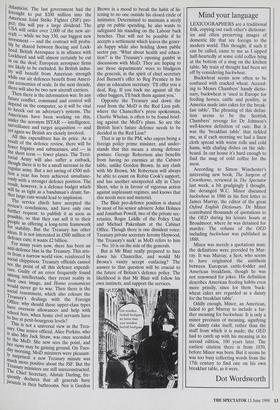Mind your language
LEXICOGRAPHERS are a traditional folk, copying out each other's dictionar- ies and often preserving images of domestic life that are foreign to the modern world. This thought, if such it can be called, came to me as I sipped half-heartedly at some cold coffee lying at the bottom of a mug on the kitchen table. My train of thought had been set off by considering buckwheat.
Buckwheat seems now often to be confused with cracked wheat. Accord- ing to Messrs Chambers' handy dictio- nary, buckwheat is 'used in Europe for feeding horses, cattle and poultry, in America made into cakes for the break- fast table'. The phrasing of this defini- tion seems to be the Scottish Chambers' revenge for Dr Johnson's well-known definition of oats. But it was the 'breakfast table' that tickled me, as if each morning we had a linen cloth spread with warm rolls and cold hams, with chafing dishes on the side- board. In our house it's hard enough to find the mug of cold coffee for the mess.
According to Simon Winchester's interesting new book, The Surgeon of Crowthome, reviewed in The Spectator last week, a bit grudgingly I thought, the deranged W.C. Minor discussed buckwheat in 1886 in his first letter to James Murray, the editor of the great Oxford English Dictionary. Dr Minor contributed thousands of quotations to the OED during his leisure hours at Broadmoor, where he was detained for murder. The volume of the OED including buckwheat was published in 1888.
Minor was merely a quotations man; the definitions were provided by Mur- ray. It was Murray, a Scot, who seems to have originated the antithesis between European cattle-fodder and American breakfasts, though he was not renowned for jokes. His definition describes American feeding habits even more prissily, since for them 'buck- wheat cakes are regarded as a dainty for the breakfast table'.
Oddly enough, Minor, an American, failed to get Murray to include a fur- ther meaning for buckwheat. It is only a minor precision of meaning, signifying the dainty cake itself, rather than the stuff from which it is made; the OED had to catch up with his meaning in its second edition, 100 years later. The earliest citation there is from 1830, before Minor was born. But it seems he was too busy collecting words from the 17th century to find one on his own breakfast table, as it were.
Dot Wordsworth


































































 Previous page
Previous page